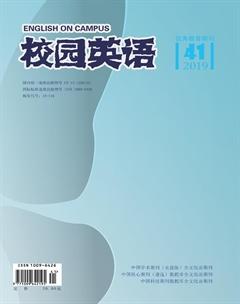An Introduction to Translation Program of the University of Manchester
【Abstract】The author is honored to be invited to the center as an academic visitor from 2017-2018 and would like to share what I have observed at this university. This paper aims at introducing the translation program of the University of Manchester.
【Key words】Translation Program; Compulsory course; Optional course
【作者簡介】钱蔚,遵义师范学院。
【基金项目】本文受国家留学基金委资助。
In 2003, the Center for Translation and Intercultural studies (short as CTI) moved from University of Manchester Institute of Science and Technology (UMIST) to the University of Manchester as the two universities were combined into one, then the Translation Program was established in this university. The center has enjoyed an international reputation in the translation community especially its graduate education and research activities, attracting translation enthusiasts and researchers from all over the world. The worlds largest corpus centre (Translational English Corpus or TEC) is also at the center.
Ι.Compulsory courses
1.Translation and interpretation, taught by professor Mona Baker with 30 credits (1.5 credits in each semester). It mainly introduces the theories and research methods of oral and written translation since the 1960s, including linguistics and sociolinguistic approaches, cognitive and process-oriented approaches, etc. At the end of each semester, the students should submit a research paper of about 4000 words and of originality.
2.Research methods in translation studies, taught by Dr. Maeve Olohan, aiming at introducing different approaches to translation studies to the students. It also deals with the textual aspects of translation theory, focusing on the selection of texts, the purpose of translation. As for the test, there are a 20-minute oral presentation (40%) and a paper proposal of 150 words and a criticism of a research method or translation (60%).
3.Faculty Research Training Course, sponsored by graduate school, with 15 credits. This course mainly introduces the research facilities of the University of Manchester, the original research skills, writing skills and computer technology necessary for the research of humanities society. The examination consists of both computer training and oral presentation.
II. Optional courses
There are three optional courses to choose from. They are more practice-based or to some extent, practice and theory combination-oriented.
1.Audiovisual Translation, taught by Dr. Peter Fawcett, 60 credits ( 30 credits each term). he will introduce the semiotics theory of film and television translation, the history and current development trend of film and television translation and so on. For the midterm exam, to translate a video is required. In the final exam, students are asked to translate two videos and provide the theoretical basis of translation in written form.
2.Technical and Commercial Translation. Taught by Dr. Maeve Olohan, 60 credits (30 credits per semester). In the first semester, she teaches two skills: information technology ability and editing ability. In the second semester, students will learn advanced applications of translation techniques, the exam consists of translation practice and translation review.
3.Literary Translation, taught by Keith Harvey. In the first semester, He mainly explains some basic knowledge of literary translation, such as the categories and problems of literary translation, etc. In the second semester, he will explain the views of famous people on literary translation since the Renaissance. The final exam will include a literature translation and a paper of about 4000 words to discuss the significance or importance of translation.
4.Intercultural pragmatics, taught by professor Mona Baker, 60 credits (30 credits per semester). The first semester mainly focuses on the main traditional theories in social pragmatics, sociolinguistics, etc. The second semester mainly helps student to find appropriate research directions in cross-cultural pragmatics and guide the research process. The final exam will be a paper of about 4000 words, too.
References:
[1]Baker , Mona , “ Corpus-based Translation Studies ” (Lecture Handout), The University of Manchester, 2004.
[2]Baker, Mona. “The Translational English Corpus (TE C )” , http: l//www. monabaker. com/tsresourses / TranslationalEnglishCorpus htm(January-28 -2005).

